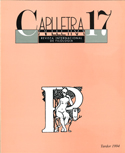La professió de lexicògraf
DOI:
https://doi.org/10.7203/caplletra.17.7399Palabras clave:
lexicografia, lexicògrafs Resumen
Resumen
At the present time, there is no doubt that lexicography takes up an important place in the field of language Science and that this fact involves the possibility of speaking about the scientific task carried out by properly trained professionals: the lexicographers.
This article reflects on the mentioned subject, paying special attention to the characteristics of the lexicographers’ work.
The first section, From the Amateur to the Professional Lexicography, explains the fact that nowadays lexicography does not remain in the hands of the amateur and the enthusiast, but in those of the professional scientist'. Lexicography has changed from «the art of making dictionaries» to «the Science and the technique of dictionaries».
The second section, The Establishment of the Scientific Lexicography, comments on the importance of the Exeter International Convention of Lexicography (1983), the creation of EURALEX and the union of efforts and research works with the aim of determining the lexicographical science.
The third section focuses explicitly on the several points of the lexicographer’s work. In this central part of the article, lexicography is placed within the limits of applied linguistics and, therefore, they insist on the fact that the lexicographer is not basically a language theorist The basic assignments in the treatment of the subject matters are commented, and the lexicographer's work is related to the rest of the branches of language science and the need to attend to questions that were obviated from dictionaries not long ago; treatment of macro and micro- structure, problems of definition, indications for the use of verbs, noun position and combinatory, etc.
Finally, the importance of the lexicographer in the establishment of language use and the need of collaboration with other specialized professionals is commented, as well as the Computer Services available for those who take up dictionary making.
 Descargas
Descargas
Descargas
Cómo citar
-
Resumen278
-
PDF (Català)93
Número
Sección
Licencia
El autor o autora que dirija un trabajo a la redacción de Caplletra para ser publicado tiene que ser la persona titular legítima de los derechos de explotación. La legitimación para la publicación del trabajo tiene que incluir también las imágenes, las tablas, los gráficos y otros materiales que puedan complementar el texto, con independencia de si es su autor o autora.
Copyright. Al publicar el trabajo en la revista, el autor o autora cede a Caplletra. Revista Internacional de Filologia los derechos de explotación (reproducción, distribución y comunicación pública), tanto para la edición impresa en papel como para la versión electrónica.
Todos los trabajos publicados en Caplletra se encuentran bajo una licencia Creative Commons del tipo Reconocimiento-NoComercial-SinObraDerivada 4.0.
RESPONSABILIDAD
Caplletra. Revista Internacional de Filologia no se identifica necesariamente con los puntos de vista sostenidos en los trabajos que publica.Caplletra. Revista Internacional de Filologia declina toda responsabilidad derivada de cualquier vulneración eventual de los derechos de propiedad intelectual que pudiera ser llevada a cabo por los autores o autoras.






